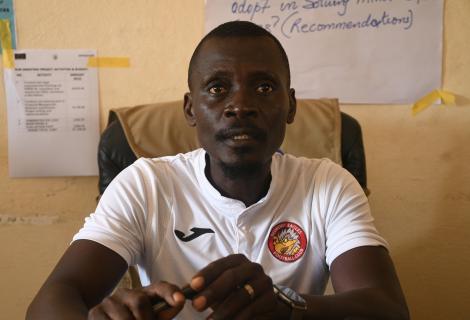‘low-level economies like ours are facing these conditions with our hands tied behind our backs’.

Joseph Blackie-CSO Leader comments on how the conditionalities of IMF affect low-level income Countries.
"In low-level economies like ours, we are facing these conditions with our hands tied behind our backs," Joseph remarked.
Reflecting on the impact of austerity measures, Joseph emphasized their far-reaching consequences on both high earners and those struggling to make ends meet. “When subsidy was removed from petroleum products and Sierra Leoneans were conditioned to pay the total cost, it became a burden on the citizens. That also skyrocketed the prices of almost all other commodities, there became no price control.”
The burden of servicing debt and complying with rigid IMF conditions weighs heavily on Sierra Leone's socio-economic landscape. "The stiff fiscal policies on loans received make it impossible for projects to be sustainable," Joseph noted. "This affects our livelihood and socio-economic survival."
Joseph stressed on the disparity between low-level economies and larger, more developed nations when it comes to debt servicing and economic priorities. “The conditions on the low-level economies should not be the same as bigger economies. We don’t even compete at forex; the Leones is not at foreign exchange. If we pay a huge chunk of our GDP for debt servicing, how can the government adequately serve its citizens?" he questioned. "Many essential areas like education, health, climate financing and infrastructure remain underserved, perpetuating a cycle of economic and social deprivation. This negatively impacts the economic, social and cultural rights of citizens, that is why in 2024, we are still experiencing blackout, something as basic as electricity is not sustainable”
The adverse impacts of economic instability extend beyond fiscal constraints, hampering investments in climate-smart interventions. " We are now experiencing climate change that affects the ability of farmers to have a profitable source of income. Farming was easier, you just plant the seeds and watch them bloom. Now the shift in the weather patterns makes irrigation extremely tedious. As a nation, we cannot properly predict weather patterns to be in readiness in case of emergencies because we don’t have the proper instruments. This is a time for us to invest more in climate-smart interventions to preserve the ecosystem,” Joseph stated.
He urges the IMF and World Bank to reconsider their approach towards low-level economies. “IMF and WB should look into conditionality ease, so that our government can flexibly implement initiatives tailored to our realities. They should also consider debt cancellation and giving a percentage of loans as grants to low-level economies for climate interventions, investing in initiatives that save the earth,” he emphasized.
In terms of universal development and equitable partnerships, Joseph highlighted the importance of low-level economies being seen as stakeholders in global economic conversations. "We should be partners in addressing global concerns," he asserted. "Our voices must be heard in negotiations with international financial institutions to fix our finance."